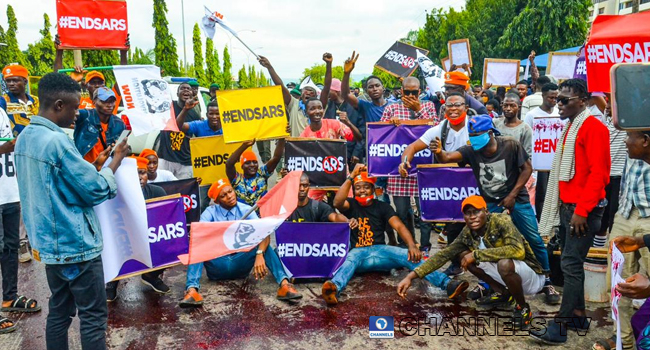As protests intensify across Nigeria and in the diaspora in an effort to force the Federal Government to scrap the notorious Special Anti-Robbery Squad (SARS), and bring an end to Police brutality in the country, it is clear that the Government’s response has so far been inadequate both in its handling of the protests and in effectively addressing the root causes.
The Banjul-based African Commission on Human and Peoples’ Rights (ACHPR) last week waded into the matter with a series of recommendations to the Nigerian Government for resolving the issues and also offered to assist Nigeria in its effort to ensure compliance by the country’s law enforcement institutions with the standards of the African Charter on Human and Peoples’ Rights.
Although the Nigerian government has said it is ready to meet the demands of the Nigerian youths who have been protesting for nearly two weeks without relenting, as the Commission noted with concern, this is not the first time that steps have been initiated to disband or reorganise the SARS.
We share the Commission’s assessment that previous steps have resulted in “a distinct lack of real reform, resulting in continued impunity for human rights violations and a perpetuation of patterns of abuse.”
We also agree with the Commission that repeated promises have been made previously for undertaking investigation into the various alleged violations perpetrated by SARS, and that those investigations, which should be the pre-requisite for both accountability and the reform required for ending human rights violations by law enforcement institutions, have not been carried out.
It is therefore difficult to dismiss the Commission’s concern over any redeployment of members of SARS to new policing units within the country before investigations and the necessary vetting of the officers to determine their non-involvement in violations are undertaken.
What is more? It is clear that the Government has a huge trust deficit among Nigerians, particularly the protesters, not only as a result of the failed promises of the past, but also because of the continuing brutality and violence against protesters even as the Government professes to acknowledge the genuineness of their grievances.
Although the Inspector General of Police has since announced the disbandment of SARS while President Muhammadu Buhari’s Administration has rolled out some measures to address the menace of SARS in particular and police brutality in general, the protests have continued to grow in scale and intensity, spreading across the country and beyond.
The 10-point SARS reform agenda announced by the Government include banning the unit from carrying out routine patrolsand checkpoint duties; prohibiting the searching of cell phones, laptops and other devices.
These steps are obviously welcome, they clearly do not go far enough. As the African Commission noted “while reports of violations of human rights by law enforcement are an alarming concern in respect of SARS, these are not limited to SARS.”
The dissolution of SARS should therefore only be seen in the light of the fact that it creates the basis for taking the necessary measures to address the human rights violations by SARS which triggered the protests and the calls for ending SARS.
Given the circumstances, the most generous conclusion that can be drawn is that the Nigerian government is willing to address the concerns of Nigerians but it does not know how to go about it.
It is for these reasons that we call on the government to embrace the African Commission’s recommendations and accept its offer to assist Nigeria in its efforts to bring its law enforcement and policing practices into conformity with the standards of the African Charter if it truly wants to stay true to its commitment to protect the lives of all Nigerians.
The African Charter on Human and People’s Rights, which was signed and ratified by 54 African countries including Nigeria, sets standards and establishes the framework for the promotion and protection of human rights in Africa.

